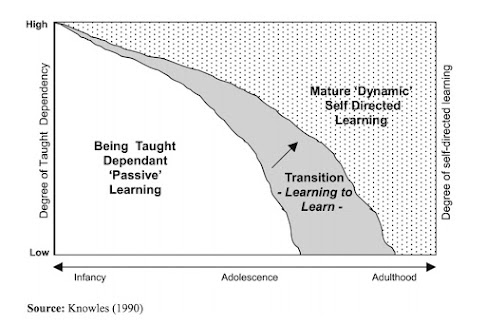Outlined below are illustrations – with appropriate caveats - of how there would be value, in encouraging critical reflection, to two of the learning organisations I have work with:
The following pictorial scenario - moving from a taught “passive” culture to an action-learning “dynamic” culture. Ref.: Dealtry (2004), P.105: The savvy learner. Has been utilised as a mechanism and back-drop to show how reflection is part of the progression of students, for both organisations. E.g.: Higher Education and Employers require reflective “Dynamic Self-directed leaners / Independent problem solvers. Example 1: Further Education (FE) Centre - Ealing, Hammersmith and West London College (Hammersmith Campus) Worked here: (2008 - 2017). BTEC L3: Extended National Diploma in Business The hyperlinked programme is a two-year course – utilised to enter Higher Education - and is equivalent to 3 A Levels and covers the fundamentals of business, consists of 7 mandatory units plus optional units. Those students who are encouraged to adopt a critical perspective and make a concerted examination and | deconstruction of assumptions, norms, expectations, limitations, language, results and applications of the course’s material invariable achieve the highest Grades: Pass (descriptive), Merit (Analytical) and Distinction (Evaluative). grade. The reflective elements is supported with coursework, tutorial and student review feedback – hyperlinked example of Level 3 programme’s specification. Example 2: Higher Education Centre (Since 2018). Pearson BTEC HND Diploma Level 5 Business (example college). On successful completion of the Level 5 Higher National Diploma, students can develop their careers in the business sector through:
The value of critical reflection – for the Higher National Diploma - is that it promotes consciousness and hence the potential for autonomy, (Independent problem solving), allowing human beings to make informed judgements that are not impeded by ‘socially unnecessary dependencies associated with subordination to inequalities of wealth, power and knowledge’ (Alvesson and Willmott, 1996: 13). The reflective elements is supported with coursework and formative / summative feedback – hyperlinked example of Levels 4 and 5 Pearson: BTEC Higher Nationals in Business |
